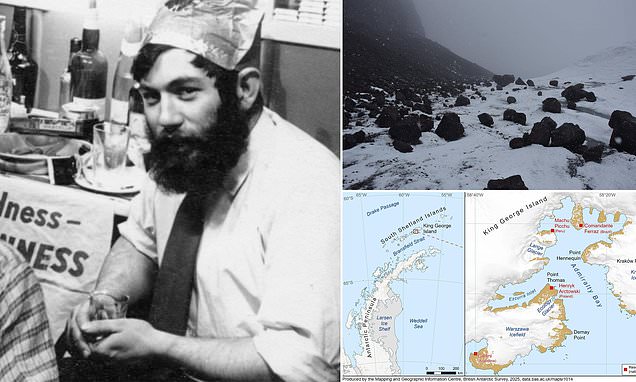
Posted on 08/12/2025 12:07:16 PM PDT by Red Badger
The mystery behind a missing British researcher in Antarctica has been solved.
The remains of Dennis Bell, who went missing in Antarctica, have been found on a glacier.
Bell went missing in 1959 in Antarctica while working as a meteorologist for the Falkland Islands Dependencies Survey.
CBS News reported more in-depth details on the discovery of the researcher:
The remains of a British researcher who vanished in 1959 in Antarctica when he was 25 years old were discovered amid rocks near a receding glacier and identified using DNA analysis, the British Antarctic Survey said Monday.
Dennis “Tink” Bell had been working as a meteorologist for the Falkland Islands Dependencies Survey, the predecessor of the British Antarctic Survey, when he died on July 26, 1959, in a crevasse on a glacier at Admiralty Bay on King George Island, located off the Antarctic Peninsula. His body was never recovered.
Bell and another man, Jeff Stokes, left the base they were staying in to survey a glacier using a dogsled, according to the survey. The snow was deep and the dogs began to show signs of tiredness, so Bell walked up to encourage them, but wasn’t wearing his skis. He suddenly disappeared into a crevasse.
According to accounts in the British Antarctic Survey records, CBS News partner network BBC News reported, Stokes lowered a belt to Bell and he was pulled up to the lip of the crevasse. As he reached the lip of the hole, though, the belt broke, and Bell fell again. He then no longer responded to his friend’s calls.
The Polish team that found Bell’s remains also found over 200 personal items, including an inscribed watch, a Swedish knife, radio equipment and ski poles.
The Daily Mail reported how Bell’s family responded to the discovery:
Scientists at the British Antarctic Survey (BAS) have announced the discovery of Dennis’ remains and personal items – among rocks exposed by the now-receding glacier.
His brother David, now living in Australia, said he and his sister Valerie are ‘shocked and amazed’ following the discovery.
‘Dennis was the oldest of three siblings and was my hero as he seemed to be able to turn his hand to anything, servicing petrol engines, photography including processing his own films,’ David said. ‘He built a radio from scratch, spending hours taking down morse code.’
‘Bringing him home has helped us come to terms with the tragic loss of our brilliant brother.’
Dennis ‘Tink’ Bell was brought up in Harrow, northwest London, before getting a job as a meteorologist at the Falkland Islands Dependencies Survey (FIDS), the predecessor of the British Antarctic Survey (BAS).
Keen for adventure, he was stationed for a two-year assignment at Admiralty Bay, a small UK base with half a dozen men, on King George Island off the northern coast of the Antarctic Peninsula.
Dennis was known on base for his humour and larger than life character, his love of theatre and eating, and for being an excellent, if messy, chef.
Russel Thomson, a colleague and friend who was on base with him, described his practical jokes and spoke of his ‘tremendous, tremendous character’.
This is a Guest Post from our friends over at WLTReport.
he worked as a meteorologist and didn’t see the storm coming...
1959... long time to be under the ice.
Bookmark
"The forecast for today, monkey's bum."
I thought the glaciers were suppose to melt by now.
I dunno, sounds kinda gay to me.
Dead 66 years or so, depending on how long it took him to give up the ghost in that crevasse.
He wasnt really missing. His friend and everybody else knew the area where his body was..
It was nice that the volcanic activity under King George Island melted the glacier enough to expose the body.
Literally every persons nightmare when they see a crevasse.
Polar Bears hardest hit
Wrong ice cap.
See. Hit so hard..poof. Gone. 🕺😎
Was it Longfellow Deeds’ grandfather?
If it had happened in the Arctic, there would have been no recovery.
That’s actually interesting. What if we transported about 100 polar bears to Antarctica, would they survive or perish?
They’d be swarmed by angry penguins. You don’t want to mess with those guys.

my first thought also.
The problem is many times you don’t see them, you are just falling, usually to your death.
Disclaimer: Opinions posted on Free Republic are those of the individual posters and do not necessarily represent the opinion of Free Republic or its management. All materials posted herein are protected by copyright law and the exemption for fair use of copyrighted works.